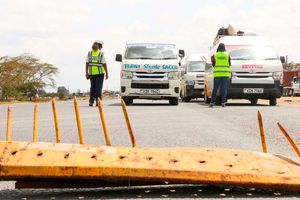Premium
Nine Kenya Power officials detained as sabotage probe continues

The prosecution was seeking to have Mr David Kamau, Mr George Kipkoech, Mr Julius Karani, Mr Geoffrey Kipkirui, Mr Anthony Gathii, Mr Martin Musyoki, Mr Joshua Wasakha, Mr Raphael Ndolo and Mr Peter Musyoki detained for 21 days, informing the court that if released on bail or bond, they might interfere with evidence and witnesses.
A Kiambu court has allowed police to detain nine senior employees of Kenya Power for eight days as police conclude investigations into their alleged role in the nationwide power blackout on January 11.
The accused appeared before Kahawa Law Courts’ Senior Principal Magistrate Boaz Ombewa.
"I have considered the submissions made in court by both parties and I am convinced by the prosecution’s team submissions that they need more time to conclude the investigation. The respondents be detained for eight days at Muthaiga Police station and come back on January 26 for mention," Mr Ombewa ruled.
The prosecution was seeking to have Mr David Kamau, Mr George Kipkoech, Mr Julius Karani, Mr Geoffrey Kipkirui, Mr Anthony Gathii, Mr Martin Musyoki, Mr Joshua Wasakha, Mr Raphael Ndolo and Mr Peter Musyoki detained for 21 days, informing the court that if released on bail or bond, they might interfere with evidence and witnesses.
The court heard that the power outage was intentional and could have been avoided given that the respondents had been informed of vandalism since December 9, but never acted.
Mr Danstan Omari, one of the advocates representing the accused, told the court the issues raised by the state are discriminative and political and are being aggregated to settle political scores. He wondered why the executive organ of Kenya Power was never summoned to shed light on the power outage.
“This is not the first time power blackout has been witnessed in the country. This is a mere negligence matter, but the state has decided to engage in a public relations exercise to incite Kenyans that these are terrorists by accusing them with economic sabotage,” Mr Omari said.
Mr Keith Robert, the investigating officer attached to the Serious Crimes Prevention Unit, told the court in his sworn affidavit that preliminary investigations had revealed that there was an act of negligence and sabotage from the respondents.
Electronic gadgets recovered
While pushing to have the nine detained for 21 days, he said the prosecution was concerned that if the accused were released on bail or bond, they might interfere with evidence.
“That due to the bulky nature of the data and electronic gadgets involved, the investigating team comprising digital and electronic cyber forensic experts are yet to comprehensively analyse the digital and electronic gadgets recovered from the respondents’ workplace, which will inform on suitable charges against the respondents, which may include serious economic crimes,” he said through an affidavit that was read in court by Ms Jillo Guyo from the Office of the Director of Public Prosecutions (ODPP).
“The investigation team is worried about the interference from the respondents since most of them share the same profession with invited independent engineers and thus their interaction may jeopardise an independent outcome,” she said.
Mr George Ng’ang’a, who is also representing the accused, told the court that they cannot be accused of economic sabotage when they were arrested as they were fixing the vandalism.
On the push by the prosecution to deny the accused cash bail, Mr Ng’ang’a told the magistrate that the respondents were cooperating with investigators.
“For six days, the respondents have been cooperating with investigating officers and nowhere has it been alleged in the affidavit that they have been trying to interfere with investigations,” he told the court.
“Mere allegations in the affidavit cannot be termed as truth or compelling reasons to detain the respondents further,” he said.
The blackout came when the Energy and Petroleum Regulatory Authority (Epra) is seeking to compel electricity utilities to compensate consumers for financial losses, equipment damage, physical injuries and death due to power outages.
Currently, Kenya Power compensates for injuries and damaged equipment, but does not pay for financial loss as a result of being cut off the electricity grid.
The draft regulations will see Kenya adopt the model in most European countries that requires utilities to compensate users whose homes and businesses are cut off from power for prolonged periods.
In 2015, the government rejected a proposed law that required Kenya Power to compensate businesses whose power is cut off for more than three hours in a day.
The Bill, which had been sponsored by Mvita MP Abdulswamad Nassir, had proposed that Kenya Power include the compensation in power bills and use it to offset future electricity costs.
The outage last week happened after towers supporting a high-voltage power line linking Nairobi to the Kiambere hydroelectric dam collapsed.
All indications pointed to possible vandalism of the installation based at Nairobi’s Imara Daima neighbourhood.





